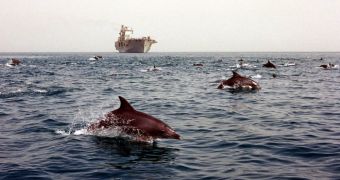As of late, the levels of noise in the planet's oceans reached incredible levels and it doubles every decade, which affects marine mammals' breeding and feeding habits in a negative way.
The relatively new sources of noise, such as ships, oil platforms (which generate seismic blasts), low-frequency sonar systems or pulse technology tests make oceans' animal life a lot harder to develop normally. This is a recent problem that is very little known, thought of and, especially, addressed. When we think of the problems that mammals such as dolphins or whales confront with on a daily basis, the noise issue isn't one that comes quickly to mind, if at all. Still, the "silent oceans" collocation gets new meanings in the light of a study indicating that between 1950 and 1975 the noise level increased by 10 decibels (900%) and it's much higher these days.
Sea animals rely on sound in order to travel, seek food and communicate. Willingly or not, humans interfere with this process by rising the levels of ocean environmental noise, thus greatly reducing the animals' ability to survive. Even more, some specific noises, like the one emanated by some military high-energy sonars, eventually lead to the death of some species of whales. Although one may think underwater human-created noise can't reach staggering levels, it's important to know that water mammals are much more sensitive to it.
For example, baleen whales, which are more scarce since whaling activities increased, use low-frequency calls that can travel distances of about 1.000 miles (1.600 km) through the water, in order to locate each other. Similarly, various species of dolphins and whales rely on high-frequency sounds in order to locate their food. As BBC showed, sound is essential for all the ocean mammals "in ways that are clearly important to their survival, though not completely understood."
Based on the efforts of the International Fund for Animal Welfare (IFAW), some ocean noise-polluting companies, such as the Navy, tried to reduce the levels of noise that they generate. But IFAW director, Robbie Marsland, believes this just won't do: "Humanity is literally drowning out marine mammals. While nobody knows the precise consequences for specific animals, unless the international community takes preventive measures we are likely to discover only too late the terrible damage we’re causing."

 14 DAY TRIAL //
14 DAY TRIAL //